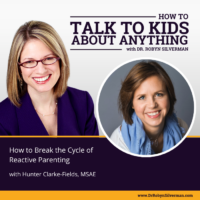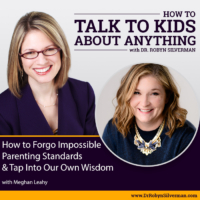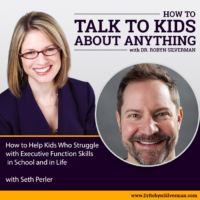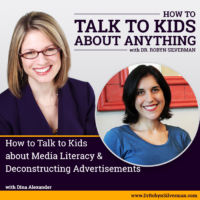Podcast: Play in new window | Download
Subscribe: Apple Podcasts | RSS | More
How to Practice Unconditional Parenting Using Love and Reason
This podcast episode focuses on unconditional parenting and how traditional parenting strategies like time-out and punishment can backfire. We ponder the question; what are your long-term goals for your child and are your parenting practices supporting or undermining that goal? It’s time to take a hard look at Unconditional Parenting and how we can support and love our children no matter what behaviors they are showing. Kids need to know that we love and care for them regardless of their behavior—because we love them for who they are not what they do. Alfie Kohn is interviewed.
Special guest: Alfie Kohn
Many parenting books offer countless tips for dealing with kids when they misbehave in the eyes of their parents—refusing to go to  bed, rejecting the vegetables they’ve been told to eat, talking back, yelling in the restaurant, badgering their sibling or resisting doing the tasks it takes to get to school on time. But the way parents cope with these challenging behaviors might be backfiring even if they work in the short term. My next guest asks many thought-provoking questions in his book, Unconditional Parenting- but two seem to be at the forefront. First; “What are your long-term objectives for your children?” and second, given those long term goals, which are likely for your child to be some version of a kind, independent, confident, competent, happy and fulfilled person—are the ways in which you are parenting lending themselves to creating that type of person IN the long run—or not? It’s time to take a hard look at some of the parenting practices that have become so common that they are accepted as the acceptable norm- time outs, positive re-enforcement, consequences, withdrawal of attention, punishment—and start taking a hard look at UNCONDITIONAL parenting- a parenting philosophy and practice in which parental love and attention is not in a push-pull relationship with how our children behave. On top of that, UNCONDITIONAL parenting puts to rest the notion that children are trying to make trouble—and instead, assumes the best of the child and looks at the child as a whole person not a compilation of good and bad behaviors.
bed, rejecting the vegetables they’ve been told to eat, talking back, yelling in the restaurant, badgering their sibling or resisting doing the tasks it takes to get to school on time. But the way parents cope with these challenging behaviors might be backfiring even if they work in the short term. My next guest asks many thought-provoking questions in his book, Unconditional Parenting- but two seem to be at the forefront. First; “What are your long-term objectives for your children?” and second, given those long term goals, which are likely for your child to be some version of a kind, independent, confident, competent, happy and fulfilled person—are the ways in which you are parenting lending themselves to creating that type of person IN the long run—or not? It’s time to take a hard look at some of the parenting practices that have become so common that they are accepted as the acceptable norm- time outs, positive re-enforcement, consequences, withdrawal of attention, punishment—and start taking a hard look at UNCONDITIONAL parenting- a parenting philosophy and practice in which parental love and attention is not in a push-pull relationship with how our children behave. On top of that, UNCONDITIONAL parenting puts to rest the notion that children are trying to make trouble—and instead, assumes the best of the child and looks at the child as a whole person not a compilation of good and bad behaviors.
Alfie Kohn is the author of 14 books on education, parenting, and human behavior, including PUNISHED BY REWARDS (1993), THE SCHOOLS OUR CHILDREN DESERVE (1999), UNCONDITIONAL PARENTING (2005), THE HOMEWORK MYTH (2006), and THE MYTH OF THE SPOILED CHILD (2014). He has appeared twice on “Oprah,” as well as on “The Today Show” and many other TV and radio programs. His articles include: “Five Reasons to Stop Saying ‘Good Job!’”, “How Not to Teach Values,” and “Atrocious Advice from ‘Supernanny.’ ” Kohn works with educators and parents across the country and speaks regularly at national conferences. He lives (actually) in the Boston area and (virtually) at www.alfiekohn.org.
The podcast provides:
- The differences between conditional and unconditional parenting
- Why not to use conventional strategies like “time-out” and what to do instead
- Why consequences can be cruel
- Why “good-job” can be doing the opposite of what you’d hope
- How to parent for the long-run—and why it’s important to do so.
Important Messages:
- We must parent for the long term—so if you want THIS, why are you doing THAT? Is what you are doing in line with or opposed
 to what you actually want for your child in the long run?
to what you actually want for your child in the long run? - For example—I want my child to be more kind and compassionate and you just showed time evidence that when I praise them for helping, it makes them more selfish. Or I want my child to be more independent but what I’ve been doing is training them to be mindlessly obedient. Something has to give!
- We don’t want to send the message that our kids are loved conditionally—and loveable conditionally.
- Need to have a core of faith in ourselves that even when we do bad things—we are still at bottom, good people. But time-outs undermine this—forcible isolation from the people who love them when they need us the most. And praise for living up to our expectations.
- “Working with” not a “doing to” approach.
- All punishments (even if we call them consequences) and all rewards (even if we call them positive reinforcement) are ways of doing things of “doing to” to kids—conditional attention and affection. Don’t just tweak- rethink it completely.
- When child behaves in a way we don’t like- instead of asking what will stop the behavior, ask, what’s going on here? Get the broader picture.
- We must convey through our behavior and our tone of voice and what we say that we never stop loving our child no matter what.
- Don’t overregulate. Ask yourself- am I doing too much telling and not enough asking?
- Kids don’t feel valued and liked by us just because we tell them “good job.” Control through seduction.
- What leads kids to feel valued and competent- is not our approval- it’s their opportunity to make choices.
- Consequences can be viewed as another punishment. We need to be people that kids trust. So if we don’t remind a child to bring a raincoat because getting wet will teach them to bring it next time is “cruel.” Going without dinner because they got in late—that’s a punishment. We are teaching our kids- you can’t trust us. Or they don’t love me enough to help me. How does the child infer it? Not about intention. No need to force a child to suffer. If a child needs assistance—help them- and help them figure out how to remember what they want to remember.
- How can I help? That’s a great phrase.
- Is what you are asking age-appropriate?
- Check in with kids and find out how you can be helpful.
- Conditional affection—based on being impressive- just as bad as praising based on being well behaved.
- Grades and approval for good grades- curiosity can evaporate- rewarding kids for doing something can destroy interest in learning it or what it took to get reward. Reward for doing love- conditional affection.
- Some parents sense of self and success is based on the vicarious success of their children. BIRG- Basking in Reflective Glory. So invested in the child’s success. Calamative to fail. Need kid to need you- problematic.
- Step back- not how do I stop by kids from doing X or start doing Y- ask broader questions that have to do with long term goals. Are we loving our kids that are counterproductive?
Notable Quotables:
-
-
- “Parenting is one area in which good research is pointing in one direction and what we are doing is pointing in another direction.”
- “Something has to give—either what we are doing or what we want.”
- “Move beyond behavior and look at kids’ needs and values and motives that underlie and inform behavior.”
- “When we focus just on kids’ behavior, we are looking at only the stuff at the surface that you can see and misses the child who engages in the behavior.”
- “Children need to be loved for who they are not for what they do. There should never be strings attached to our level of care.”
- “We need to love kids for no damn good reason. Even when they screw up or fall short they should never feel that our attention, acknowledgement or care should be turned off or reduced because of their action. If kids get that message from us that they need to jump through our hoops in order for us to be proud o them and to love them then they begin to internalize that message that they are not only loved conditionally but loveable conditionally.”
- “There has to be a sense of what we say, how we say it, our tone of voice and body language all communicate to kids that even when something goes wrong they know ‘my mom or dad never stop loving me.’”
- “Ask yourself; why am I doing so much overregulating of my child? Kids learn to make good decisions by making decisions- not by following directions. Ask yourself; am I doing too much telling and not enough asking?”
- “Consequences in general tends to be a euphemism for punishment—where we deliberately make kids unhappy in the hope that it will change them for the better in the future.
- “A courageous parent begins by saying; “if a child is not doing something that I’m asking, maybe the problem is not with my child but with what I am asking.”
- “The more you reward kids for doing something, the more they lose interest in whatever they had to do to get the reward.”
-
Resources:
-
PUNISHED BY REWARDS (1993)
-
UNCONDITIONAL PARENTING (2005)
-
THE HOMEWORK MYTH (2006)
-
THE MYTH OF THE SPOILED CHILD (2014)
“Five Reasons to Stop Saying ‘Good Job!’”(article)
“How Not to Teach Values,” (article)









